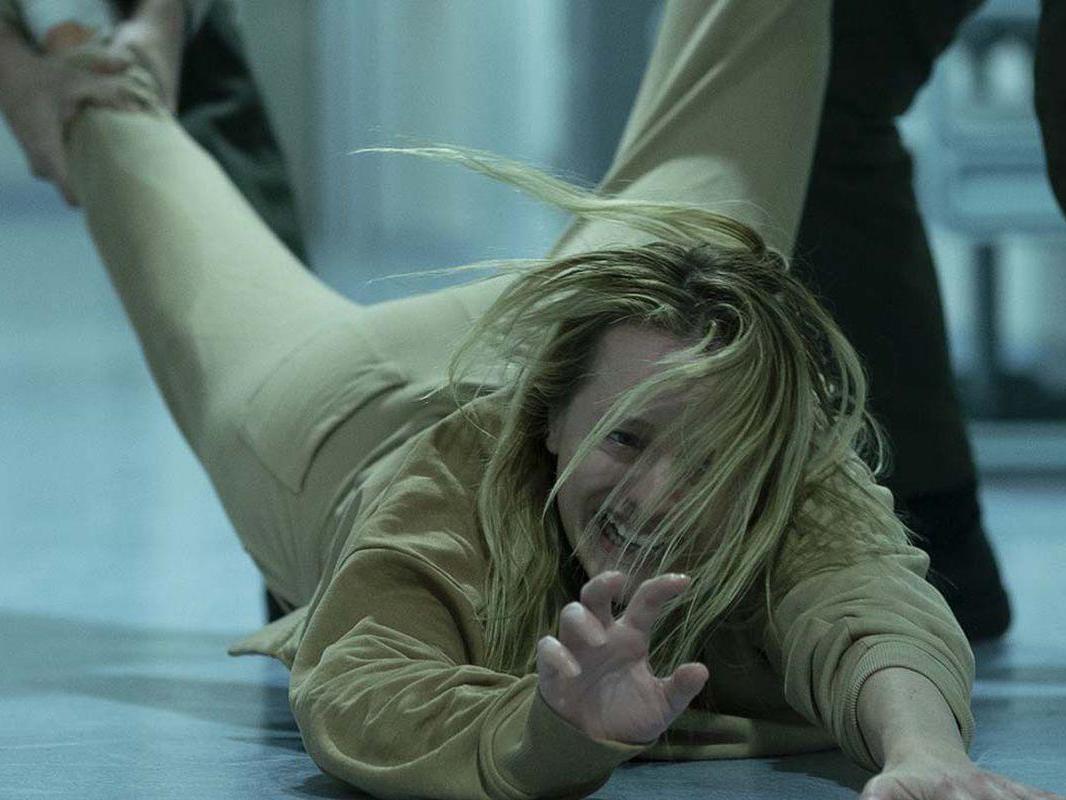We never saw it coming: five horror scenes that twist the knife on unsuspecting viewers
A disorienting scene midway through ‘The Invisible Man’ shocked even a seasoned horror fan like Erik Piepenburg. Here he recalls five more films that took gruesome detours down the right path

Like many horror fans, it’s hard to scare me with garden-variety maniac killers and grisly deaths. But there’s a moment about midway through new film The Invisible Man that shocked me so vividly I did something I’ve never done at a horror movie: I shot out of my seat and let out a scream. As the scene continued, I couldn’t move. The woman next to me also screamed, uncontrollably. It was heaven. (To avoid compromising the integrity of the scare, let’s just say it involves a nice restaurant, a big knife and Elisabeth Moss.)
What makes the scene so stunning isn’t how startling and bloody it is. (It’s both.) It’s how the moment thrillingly and thoroughly befuddles the viewer’s expectations. Unlike a plot twist or a killer reveal in the final moments of a horror movie, an unforeseen shock early or midway in a film reorients the story and disorients the viewer. Just when you think the film is this, it actually becomes that. It’s like experiencing two movies for the price of one. Here are five other horror films with knockout rug-pullers that will make you say: wait, what?
Psycho (1960)
The wet and bloody demise of Marion Crane (Janet Leigh) in a shower at the Bates Motel remains a shockingly effective jaw-dropper thanks to Alfred Hitchcock’s precision cuts, Bernard Herrmann’s shrieking score and lots of red in black and white. But it also remains jarring because Marion, introduced as if she were to be the final girl (as she’d be called today), is killed off about a third of the way through the film. It’s a narrative gotcha that was almost unheard-of in cinema of the time, especially for an actress as celebrated as Leigh. A surprise death early in a story is a plot jolt that still startles, whether it’s for Drew Barrymore’s character in Scream or for an entire wedding party in Game of Thrones.
When a Stranger Calls (1979)
In the near-20-minute opening scene of this film, directed with bravura by Fred Walton, Jill, a babysitter (played by Carol Kane), is menaced by a deranged prank caller who asks: “Have you checked the children?” After more prank calls, the young woman gets in touch with the police, who trace the call. After one more prank call, a sergeant phones back with a dire warning: “We’ve traced the call. It’s coming from inside the house!” Often a shocker is a violent act, as in Psycho. But here the terror is in Jill’s eyes, and the horror is in imagining what happens in the following seconds. With landlines largely gone the way of phonographs, this one is a delightfully analogue fright.
Funny Games (1997)
Reality is treated to a bombshell moment in one dramatically meta scene from Michael Haneke’s deeply disturbing home invasion film. It occurs later in the story when a woman being held captive in her home by two men shoots one of them. The man’s co-conspirator then fixes the mishap in their plan by using a remote control to rewind the movie itself, as if it were in a VCR. It then plays again, with the scene (and history) rewritten as if the shooting never occurred. It’s a visually and narratively disruptive moment that unsparingly reminds the viewer that evil calls the shots in this film, and that revenge and justice will ultimately have no place in it.
Hereditary (2018)
As Hitchcock did in Psycho, Ari Aster quickly kills off a character in his bloodcurdling family nightmare. But it’s not the protagonist who gets the axe – it’s the presumptive antagonist. From the start, it’s clear that Charlie (Milly Shapiro) is a creepy, troubled teenager who may be the film’s demon child. Things shift when she suffers a severe allergy attack. Her brother, Peter (Alex Wolff), drives apace to get her to the hospital. But when Charlie puts her head out of the window to get some air – and Peter swerves to avoid hitting an animal carcass – she’s decapitated by a utility pole. It’s a horrifying and pivotal plot interruption that comes from left field to capsize the story. Aster amplifies the horror by showing, in just seconds, the gruesome death of a child, a taboo for a mainstream horror movie.
Parasite (2019)
There are many moments that change the trajectory of Bong Joon Ho’s Oscar-winning film about how a working-class clan commands the household of a more prosperous family. But one incident pulls the rug out. About halfway through, the rich family’s former housekeeper (Lee Jung Eun) – who has been pushed out by the newcomers – rings the doorbell on a rainy night. She enters the home and, through a series of thrilling reveals, enters a hidden basement where her husband has been living unbeknown to everyone else. The scene ferociously and swiftly shifts Parasite from a dark social-status comedy to a macabre social-status horror movie, and sets in motion the rest of its wicked twists.
Subscribe to Independent Premium to bookmark this article
Want to bookmark your favourite articles and stories to read or reference later? Start your Independent Premium subscription today.

Join our commenting forum
Join thought-provoking conversations, follow other Independent readers and see their replies